Podcast
Questions and Answers
What does potential energy depend on?
What does potential energy depend on?
- The shape of the object
- The temperature of the object
- The mass and height of the object (correct)
- The speed of the object
What happens to potential energy when an object begins to move?
What happens to potential energy when an object begins to move?
- It increases indefinitely
- It becomes thermal energy
- It is converted into kinetic energy (correct)
- It is lost to the environment
What statement about energy is correct?
What statement about energy is correct?
- Energy is always lost when transferred
- Energy is only found in visible forms
- Energy can be created and destroyed
- All energy is either kinetic or potential (correct)
Which formula correctly represents potential energy?
Which formula correctly represents potential energy?
When does an object have the most kinetic energy?
When does an object have the most kinetic energy?
Flashcards
Energy
Energy
The ability to do work. It's everywhere, even if we can't see it.
Potential Energy
Potential Energy
Stored energy. The higher an object, the more potential energy it has.
Kinetic Energy
Kinetic Energy
Energy of motion. The faster an object moves, the more kinetic energy it has.
Law of Conservation of Energy
Law of Conservation of Energy
Signup and view all the flashcards
Potential Energy to Kinetic Energy
Potential Energy to Kinetic Energy
Signup and view all the flashcards
Study Notes
Energy Basics
- Energy is the ability to do work. All events in the world involve energy.
- Energy is not visible but is present everywhere.
- Energy is never created or destroyed; it's only stored or transferred.
- All matter comprises particles that are always in motion.
Potential Energy
- Potential energy is the energy stored in an object, representing its capacity for doing work later.
- The higher the object, the greater its potential energy.
- The more massive an object, the more potential energy it has.
- Formula: Ep = mgh, where:
- Ep = potential energy (Joules)
- m = mass (kilograms)
- g = acceleration due to gravity (approximately 9.8 m/s² or 10 m/s²)
- h = height (meters)
- Potential energy transforms into kinetic energy as the object moves.
Kinetic Energy
-
Kinetic energy is the energy of a moving object.
-
"Kinetic" relates to movement.
-
The faster an object moves, the more kinetic energy it possesses.
-
An object's kinetic energy is highest when its speed is greatest.
-
When potential energy is lowest, kinetic energy is highest.
-
Formula: Ek = ½mv², where:
- Ek = kinetic energy (Joules)
- m = mass (kilograms)
- v = velocity (meters per second)
Types of Energy
- Energy exists in two main forms: potential and kinetic.
Studying That Suits You
Use AI to generate personalized quizzes and flashcards to suit your learning preferences.




